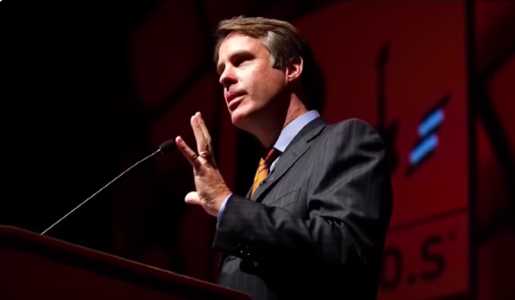ABC News pulls anchor off air after controversial late-night post sparks backlash
- Replies 0
For those who’ve followed broadcast journalism for decades, one familiar voice is suddenly off the air.
A longtime correspondent known for his deep dives into political affairs is now at the center of a storm.
What began as a late-night comment online has triggered swift consequences from both inside and outside the newsroom.
And once again, the boundaries between media, politics, and personal commentary are under the spotlight.
The comments were unusually pointed for someone tasked with delivering straight news. Even though the post was deleted shortly afterward, it didn’t go unnoticed. Screenshots of the remarks circulated quickly, drawing immediate attention from both critics and supporters online.
A key spokesperson for the Trump administration called the post “deeply troubling” and criticized the network for allowing such commentary to come from a prominent journalist. She called on ABC News to take action, going as far as to suggest the anchor should be suspended or let go entirely.
Within a matter of hours, the network confirmed that it had, in fact, suspended the journalist.
They cited a breach of internal standards, stating, “The post does not reflect the views of ABC News and violated our standards.”

As the organization stated, it “does not condone subjective personal attacks on others.”
This kind of swift response isn’t entirely new, but it underscores the seriousness with which networks approach online conduct, even for longtime staffers with decades of experience.
In the age of constant online interaction, even one late-night post can become a national controversy. This isn't the first time a prominent name in journalism has faced consequences for what was said outside of traditional reporting—on a personal account, after hours.
Also read: ABC's million-dollar settlement with Trump sparks debate—is democracy under threat?
He claimed that the journalist’s opinion showed how “radicals” are “adopting a journalist’s pose,” and accused the press of long-standing bias.
Elsewhere, a current high-ranking government official defended the aide under fire. He called him “motivated by love of country” and demanded that the network apologize. These responses show just how politically charged even a single sentence can become when it’s coming from a national reporter.
Also read: A major news outlet just regained White House access—what it could mean for press freedom
For viewers who rely on major outlets to understand what’s happening in the world, the episode raises real questions. Is the role of a journalist today different than it was decades ago?
Is objectivity still possible when opinions—whether intentional or not—are broadcast to millions in an instant?
And is a single post enough to discredit years of reporting?
That could mean a quiet return, or something more permanent. Regardless of what comes next for this particular anchor, the ripple effects of this incident will likely linger—for the newsroom, for the public, and for the industry at large.
Many longtime viewers have seen the media shift over the years. This case shows how quickly credibility can be questioned—even when it’s built up over decades. As news outlets face increasing pressure to demonstrate neutrality, each move is watched more closely than ever before.
And when journalists step outside the expected lines, the consequences are immediate and public.
Read next: "I never heard of you": Trump shocks reporter during oval office sit-down

Should reporters face discipline for expressing opinions outside of their official reporting? Has your trust in national news increased or declined in recent years? Is social media helping or hurting the credibility of the press? Where should networks draw the line between personal freedom and professional standards? Join the discussion in the comments below.
A longtime correspondent known for his deep dives into political affairs is now at the center of a storm.
What began as a late-night comment online has triggered swift consequences from both inside and outside the newsroom.
And once again, the boundaries between media, politics, and personal commentary are under the spotlight.
A post that exploded overnight
Just past midnight, a senior journalist at ABC News shared a personal opinion online about two well-known political figures. In a post that was later deleted, the anchor described one of them as using hate “as a means to an end,” while the other, he wrote, “eats his hate.”The comments were unusually pointed for someone tasked with delivering straight news. Even though the post was deleted shortly afterward, it didn’t go unnoticed. Screenshots of the remarks circulated quickly, drawing immediate attention from both critics and supporters online.
White House reaction sets events in motion
By morning, the situation had already escalated.A key spokesperson for the Trump administration called the post “deeply troubling” and criticized the network for allowing such commentary to come from a prominent journalist. She called on ABC News to take action, going as far as to suggest the anchor should be suspended or let go entirely.
Within a matter of hours, the network confirmed that it had, in fact, suspended the journalist.
They cited a breach of internal standards, stating, “The post does not reflect the views of ABC News and violated our standards.”

ABC News pulls anchor off air after controversial late-night post sparks backlash. Image Source: NBC Montana / YouTube
ABC’s longstanding expectations for its journalists
Major news networks like ABC hold strict guidelines for how their correspondents engage online—especially on topics tied to politics. Maintaining objectivity is not only a matter of policy, but also of public trust.As the organization stated, it “does not condone subjective personal attacks on others.”
This kind of swift response isn’t entirely new, but it underscores the seriousness with which networks approach online conduct, even for longtime staffers with decades of experience.
Why this story is striking a nerve
For many, this situation brings up broader concerns. Journalists are expected to be impartial, but they are also human beings with personal beliefs.In the age of constant online interaction, even one late-night post can become a national controversy. This isn't the first time a prominent name in journalism has faced consequences for what was said outside of traditional reporting—on a personal account, after hours.
Also read: ABC's million-dollar settlement with Trump sparks debate—is democracy under threat?
Voices from the political world react
The backlash didn’t just come from the press office. One well-known former adviser to President Trump, who was directly named in the original post, fired back publicly.He claimed that the journalist’s opinion showed how “radicals” are “adopting a journalist’s pose,” and accused the press of long-standing bias.
Elsewhere, a current high-ranking government official defended the aide under fire. He called him “motivated by love of country” and demanded that the network apologize. These responses show just how politically charged even a single sentence can become when it’s coming from a national reporter.
Also read: A major news outlet just regained White House access—what it could mean for press freedom
For viewers who rely on major outlets to understand what’s happening in the world, the episode raises real questions. Is the role of a journalist today different than it was decades ago?
Is objectivity still possible when opinions—whether intentional or not—are broadcast to millions in an instant?
And is a single post enough to discredit years of reporting?
The uncertain path ahead
ABC News has not confirmed what the final outcome will be. Their official statement says the suspension is “pending further evaluation.”That could mean a quiet return, or something more permanent. Regardless of what comes next for this particular anchor, the ripple effects of this incident will likely linger—for the newsroom, for the public, and for the industry at large.
Many longtime viewers have seen the media shift over the years. This case shows how quickly credibility can be questioned—even when it’s built up over decades. As news outlets face increasing pressure to demonstrate neutrality, each move is watched more closely than ever before.
And when journalists step outside the expected lines, the consequences are immediate and public.
Read next: "I never heard of you": Trump shocks reporter during oval office sit-down
Key Takeaways
- ABC News suspended longtime journalist Terry Moran after he called Donald Trump and Stephen Miller “world-class haters” in a now-deleted online post.
- The Trump administration condemned the remarks, with a press secretary urging Moran’s suspension or termination.
- ABC News confirmed the suspension, citing a violation of impartiality and stating the comments didn’t reflect their standards.
- The event reignited national debate on whether journalists can balance personal opinions with professional objectivity.






